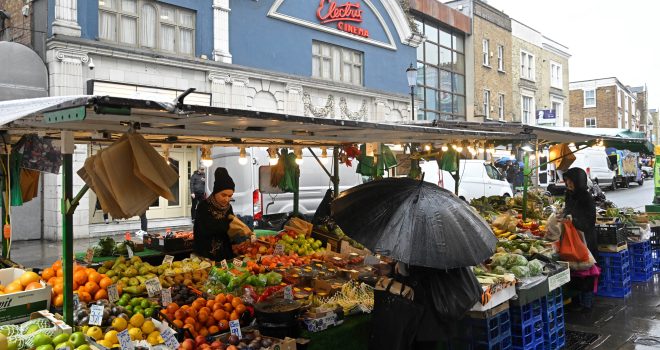British Beer-Maker Stockpiling Malt To Try To Beat Price Squeeze

At the Milton Brewery in eastern England, Richard Naisby’s warehouse is jammed full of pallets stacked high with sacks of malt, a key ingredient for his traditional cask beers.
Whereas he mostly used to order the grain when he needed it, Naisby is now stockpiling, buying three to four months of supply in advance to try to stave off the impact of soaring prices.
“Things are going through the roof,” he said. “Malt’s gone up 40% to 50%.”
Small businesses like his in Britain are being hammered by rising costs which they would struggle to pass onto cash-strapped consumers.
Inflation is hovering at over 10%, close to 40-year highs, and official figures show the prices of food and non-alcoholic drinks was 16.8% higher in December than a year before. Gas and electricity prices were up 130% and 65% respectively in the year to December, the statistics office says.
It has left many small businesses fighting for survival.
Naisby, who says he is lucky to have a fixed contract for his energy until 2024, said he had saved himself about 2,000 pounds ($2,480) by buying as much malt as he could fit in before a supplier raised prices in January. The 50% rise for some malt types this year came on top of a 20% increase last year.
“Cumulatively of course that’s very, very difficult for us to withstand,” said Naisby, as he manoeuvred battered steel casks full of the real ale he sells to pubs, including three of his own, near Cambridge.
He has put his prices up by 7% over the past year, but like many smaller companies, he finds himself squeezed in the middle: not big enough to negotiate better rates from suppliers and facing resistance to price hikes from buyers.
The new battle against mounting costs comes after the COVID lockdowns brought many small firms to their knees.
During the pandemic, the government provided support through a mix of grants, loans and temporary tax cuts. Following the jump in energy prices, it set up a scheme to help with utility bills which runs to the end of March, with a scaled back scheme for a year after that. But price rises are still punishing.
MORRIS MINOR
For William Fugard from Gusto Organic, the glass bottles in which he sells his up-market soft drinks have risen from 8 pence each to 17 pence. Over the course of last year citrus ingredients shot up by between 25% and 35% in price, he said.
Emma Macdonald, founder of The Bay Tree, which makes chutneys and jams in Devon, southwest England, said that in the past year diced onions and tomatoes had doubled in price, while sugar was up between 20%-40% depending on the type.
“Half the time you don’t even know the price has gone up until you place an order,” she said, adding that the usual couple of months’ notice on any increase had been abandoned.
Their experiences are a far cry from the hopeful message delivered by Bank of England Governor Andrew Bailey this month, who said there were signs that inflation might be starting to turn a corner after it edged down to 10.5% in December from 10.7% in November.
Five miles across the windswept fenland from Naisby’s brewery is one of his pubs, The Haymakers.
There he sells pizzas alongside Pegasus, his award-winning beer. Last year he sold pizzas for 13 to 14 pounds. They now cost nearer to 15 pounds because of a 50% jump in the price of tinned tomatoes.
“We can’t pass on all the price rises and certainly not immediately,” said Naisby, who employs about 40 people in his pubs and four at the brewery. Together the businesses have an annual turnover of about 2 million pounds ($2.5 million).
After doing the sums, he found that for small, local deliveries of casks it was cheaper to shun his big van and go instead in his decades-old Morris Minor, a post-war car whose sight on the roads today is nothing short of quirky.
He said: “We’re just looking into every single aspect of the expenses that we incur to try and make a living.”
(Reporting by Sarah Young; Additional reporting by Yadarisa Shabong; Editing by Alison Williams)




